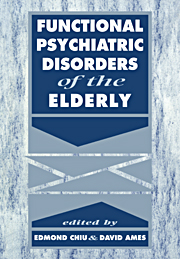Book contents
- Frontmatter
- Contents
- List of contributors
- Preface
- Introduction – A personal note
- Acknowledgement
- Part 1 Classification
- Part 2 General epidemiology
- Part 3 Neuroses
- Part 4 Affective disorders
- Part 5 Psychosexual disorders
- 15 Psychosexual disorders
- Part 6 Substance use and abuse
- Part 7 Schizophrenia and related psychoses
- Part 8 Psychological, biological and medical issues
- Part 9 Treatment methods
- Part 10 Conclusion
- Index
15 - Psychosexual disorders
from Part 5 - Psychosexual disorders
Published online by Cambridge University Press: 13 November 2009
- Frontmatter
- Contents
- List of contributors
- Preface
- Introduction – A personal note
- Acknowledgement
- Part 1 Classification
- Part 2 General epidemiology
- Part 3 Neuroses
- Part 4 Affective disorders
- Part 5 Psychosexual disorders
- 15 Psychosexual disorders
- Part 6 Substance use and abuse
- Part 7 Schizophrenia and related psychoses
- Part 8 Psychological, biological and medical issues
- Part 9 Treatment methods
- Part 10 Conclusion
- Index
Summary
Introduction
A Darwinian might question the role of sexual behavior in the elderly, pointing out that the purpose of any species was to increase its kind, and coitus beyond the menopause had little to contribute to this aim. If so, he would be mistaken, because the sexual act is not only penetration and fertilization, but is preceded by grooming, whose purpose in primates is to reinforce social bonds. As the human child takes at least 15 years to reach physical maturity, the survival of the last born will depend on this bond lasting until the mother is 65, and the male 70 (due to the need of the female to chose her mate on his status he is usually older by five years (OPCS, 1992)). The earlier death of the male (his expectation of life in the UK in 1988 was 72.4 compared to 78 for the female (OPCS, 1992)) might suggest that he plays a lesser role in child-rearing, or is not really adapted to monogamy (Reynolds & Kellett, 1991). The advantage to the species of prolonging life beyond this point is more controversial, though the elderly may stabilize society as carriers of the culture and provide support for their progeny in rearing their children. Either way, the preservation of the marriage bond can improve the quality of the couple's lives as they compensate for their declining abilities. Male carers of demented wives do better when the sexual contact is retained (Morris, Morris & Britton, 1988).
- Type
- Chapter
- Information
- Functional Psychiatric Disorders of the Elderly , pp. 247 - 266Publisher: Cambridge University PressPrint publication year: 1994



